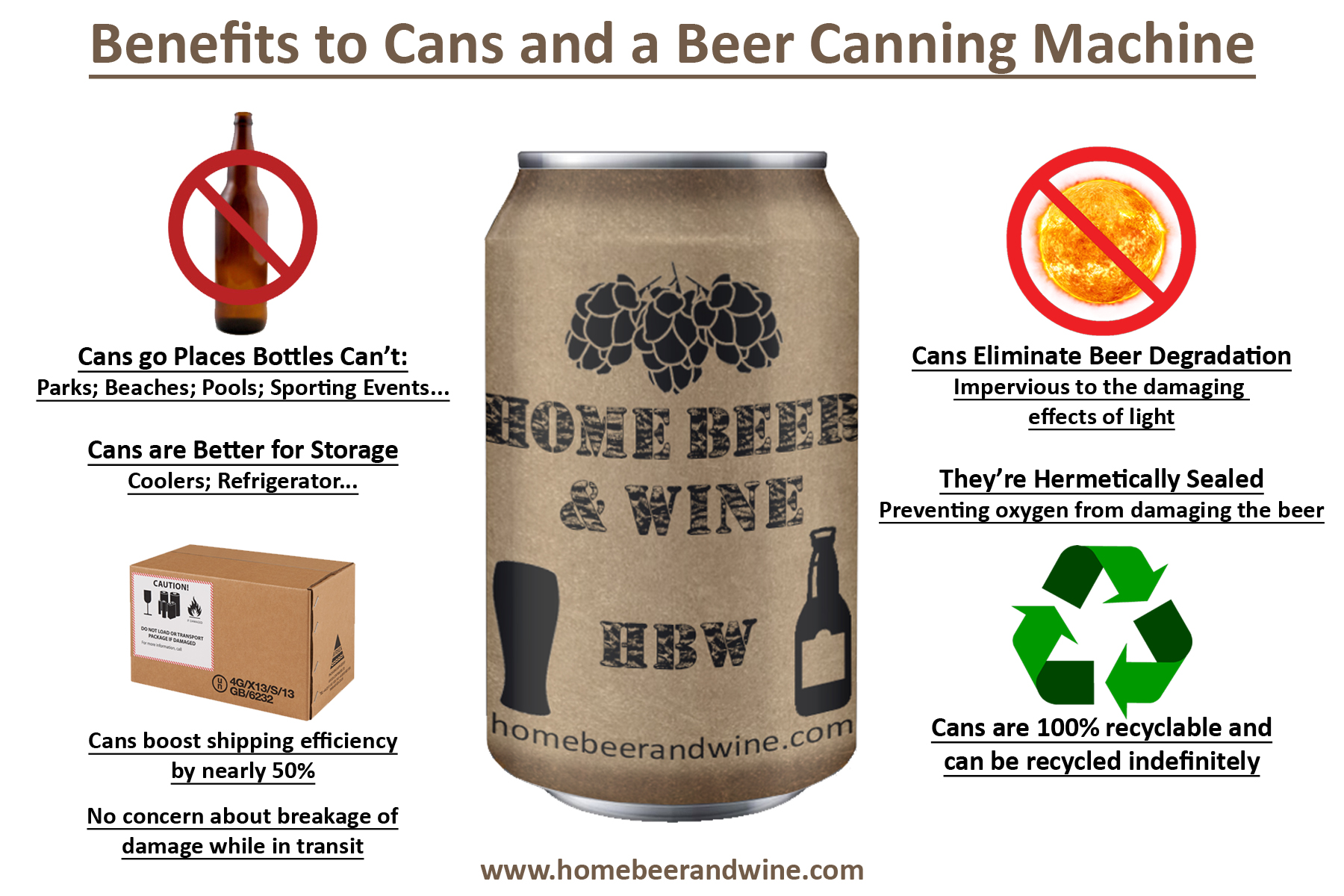The least fun part of homebrewing is most likely the part when you have to bottle the beer. Even though you’re near the end of the brewing process the bottles are heavy and hard to store. Most importantly, beer bottles are also difficult to sanitize which can effect the taste of your beer. So the questions is – what are the benefits of a beer canning machine and should you own one?
Here is a great product review of the beer canning machine as it comes out of the box. The same company that makes the beer canning machine also sells aluminum cans (Wisconsin Aluminum Foundry), but there are many other suppliers out there that you can also contact for cans.
How Much is a Beer Canning Machine
The cost of a beer canning machine can vary widely depending on several factors, including its capacity, features, and whether it’s new or used. As of my last knowledge update in September 2021, here are some approximate price ranges for beer canning machines:
- Small-Scale Manual Canning Machines: These are typically used by small craft breweries or homebrewers and can fill a limited number of cans per minute. Prices for small-scale manual canning machines can start at around $500 to $5,000 or more, depending on the brand and features.
- Semi-Automatic Canning Machines: These machines can fill cans at a higher rate than manual machines but may still require some manual labor for certain tasks. Prices for semi-automatic canning machines can range from $10,000 to $50,000 or more, depending on capacity and features.
- Fully Automatic Canning Lines: Large-scale breweries and beverage companies often use fully automatic canning lines, which can fill and seal a high volume of cans per minute. These can be significantly more expensive, with prices ranging from $100,000 to several million dollars, depending on the production capacity and complexity of the line.
- Used or Refurbished Machines: You can sometimes find used or refurbished canning machines at a lower cost than new ones. The price for used machines will vary based on factors like age, condition, and capacity.
Benefits of Cans and a Beer Canning Machine
1. Cans Go Places Bottles Can’t and They’re Better for Storage
One of the best parts of homebrewing is being able to share your batch with friends. Obviously, you can share bottled beer with friends at home. But if you’re planning on taking some beer to the beach, boating, pools, parks, or even a place like beer league hockey than cans are much more favorable than bottles. Cans are better for coolers because they’re lighter, more compact, and they chill quicker.
Cans also take up less storage space. If you are brewing in a small space you may be in a position where every square inch counts. Cans will be extremely friendly to your refrigerator if you don’t plan on leaving the beer in a keg.
2. Shipping Cost and Transit Safety
Cans boost shipping efficiency by nearly 50% over their bottle counterparts. If you are shipping to friends or relatives outside of your local area than cans will really help with your shipping costs. Cans are much lighter and more compact than beer bottles. An empty 12-ounce bottle weighs about 7 ounces, whereas an empty can weighs only about a half ounce.
Also, transit safety for cans is key. You won’t really have to worry about broken bottles with beer spilling everywhere as you ship your beer. If you are a craft brewery than this point is very important for you. Over time, the cost of the beer canning machine will pay for itself if you ship a lot of beer.
3. Cans Eliminate Beer Degredation
By using cans you’re eliminating the effects of oxygen and and light on your beer. These two things can help spoil beer faster if precautions aren’t taken. Nobody wants to crack open a brew only to find a skunked beer inside. That’s one way to kill a party fast. Cans are impervious to the damaging effects of light. Brown glass bottles are better than green or clear bottles, but light can still penetrate through brown glass. Cans are air tight and hermetically sealed, preventing oxygen from damaging the beer. Over time, oxygen can seep into bottled beer under the cap, especially with improperly sealed caps or twist-off caps. Additionally, many caps corrode, leaving behind a “metallic” or “iron-like” flavor around the lip of the bottle.
Beer cans have come a long way over the years. They’re no longer made of tin or steel. Modern cans are made of aluminum, and they have an aqueous polymer liner that locks in flavor and keeps the beer from coming in contact with the aluminum, so there is no longer a “metal” taste. If you drink draft beer, just think of cans as mini-kegs of beer.
4. There are Environmental Benefits
Cans are 100% recyclable and can be recycled indefinitely. Cans are easier to recycle because they crush down, making them more compact, they do not break and they are much lighter than glass. Aluminum cans are recycled much more than glass bottles, and new cans contain more recycled content. Many recycling centers do not pay for glass bottles. Especially, if you’re outside one of the 10 “Beer Bill” states. Those states require deposits, whereas many recycling centers do pay a good amount for aluminum cans – usually between $1,400 and $1,600 per ton. Lastly, if you package your beer than a 6 pack of cans requires less packaging than a 6 pack of bottles.
Conclusion
With a beer canning machine, that mini-keg of beer is now more accessible to the general public and homebrewers. There are now more than 500 craft breweries packaging in cans. In 2007, there were less than 100. Full data about the rapid growth of cans was published by the Brewers Association. As the trend flows down through the craft breweries hopefully it will trickle down to your home.

